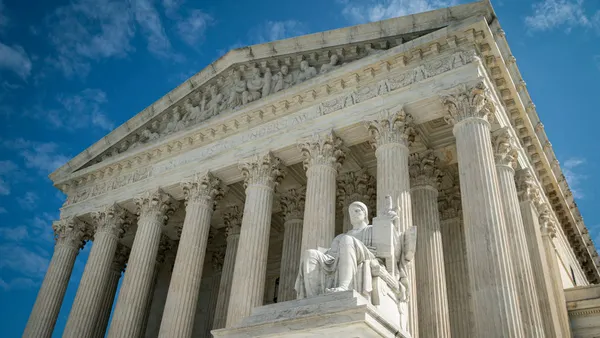Dive Brief:
- Time spent in security checks involving items brought to work purely for employees' personal convenience is "hours worked" under California wage orders, the California Supreme Court has ruled (Frlekin v. Apple Inc., No. S243805 (Cal. Supreme Ct. Feb. 13, 2020)).
- The court reached that ruling in a lawsuit challenging Apple's bag-search policy, which requires mandatory searches of employee bags and personal Apple technology devices before employees leave the store for any reason. Technology must be cross-checked to verify serial numbers and the unpaid searches generally take between five and 20 minutes but sometimes take as long as 45 minutes, if lines are long, the workers alleged.
- The California Supreme Court said the state requires compensation when employees are subject to an employer's control, and the time the Apple employees spend waiting for and undergoing security checks "clearly" qualified. Additionally, that time is for the employer's benefit — theft reduction — rather than the employees', another factor weighing in favor of compensation. The fact that the employees choose to bring personal items to work does not negate the fact that the time must be paid, the court concluded.
Dive Insight:
Frlekin dealt with California wage and hour requirements, which impose more stringent requirements on employers than federal law does. And several California employers have landed in hot water recently over their bag check policies; Dick's Sporting Goods, for example, recently paid out nearly $3 million to a class of almost 11,000 current and former employees in California who said they were required to undergo off-the-clock security checks. Nike and its subsidiary Converse have also dealt with similar allegations.
Under the Fair Labor Standards Act (FLSA), time spent on pre- and post-shift activities "may or may not" be considered hours worked, depending on the circumstances, according to the U.S. Department of Labor.
For example, "[w]alking, riding, or traveling to and from the actual place where you perform the principal activities which you are employed to perform would not be hours worked," according to the agency. Driving to a parking area and riding to a work site in a company bus would be noncompensable time, it said.
Similarly, DOL said, an employee deciding to shower at the end of the workday for his or her own "benefit and convenience" would not be paid for that time. However, time spent putting on and taking off required protective gear (sometimes referred to as "donning and doffing") is often considered work time that must be paid.
The U.S. Supreme Court held in a 2014 opinion involving Amazon security checks that such time need not be paid. However, experts have warned that the ruling was fact-specific and employers may need to consult counsel for individual situations.









